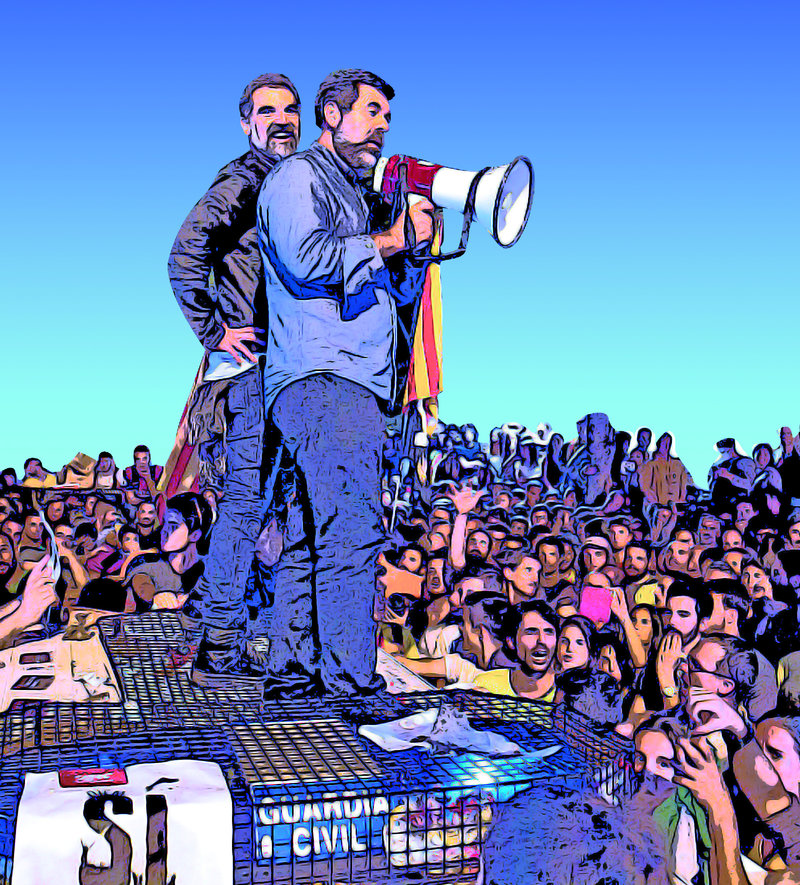Long-term resident
ALIVE
On September 20, 2017, Spanish Civil Guards raided the Catalan Ministry of the Economy, searching for material related to the independence referendum scheduled for October 1st. A spontaneous demonstration started outside the building around 9am. Later that day, when there were around 40,000 people outside the Ministry, Jordi Sànchez, the then president of the grass-roots Catalan National Assembly, and Jordi Cuixart, president of what is now the world’s second largest cultural association, Òmnium Cultural, stood on the roof of a Guardia Civil patrol car parked in front of the Ministry and made a couple of short speeches. Later on, they asked the crowd to disperse (there is video footage of Cuixart doing just this). Not long after, they were charged with violent rebellion and sedition and on October 16th, 2017, they were imprisoned on remand without bail. Having spent several months in a Madrid penitentiary, in July of this year they were finally transferred to one in Catalonia, as close as possible to their homes (as prescribed by Spanish, European and international law). Recently, a delegation of Scottish and Welsh MPs from the Westminster All Party Parliamentary Group on Catalonia, visited Cuixart at Lledoners prison, near Manresa (I was the interpreter).
The director ushered us into a meeting room (a handful of chairs, grey walls). Jordi, a little late as he had had to clean up after pottery class, finally bounced into the room and shook everyone’s hands as cordially as if we’d dropped round to his flat for a drink and nibbles. Once we were all sitting more or less comfortably, a member of the delegation asked him how he was. From the answer, we learnt that he was happy to be in jail, because he had received so much support in the form of letters from thousands of ordinary citizens and from artists in all fields both in Catalonia and from abroad (he was especially pleased to get a letter of support from Ken Loach, of whose films he was an unconditional fan); that even when he was sad - which happened especially when he thought about his partner and their infant son - he was happy, because he knew it was impossible to be happy without the presence of some sadness; that he made the most of the positive things that came his way, such as the one and a half hours he could spend with his son per week, or conversations such as the one he was having with us; that in Madrid, the wardens had tried to keep him away from the other inmates but he had insisted that he be among them and be treated like one of them, because human contact is both essential as well as interesting; that the Catalan independence movement wasn’t ethnic, given that 70% of Catalans came from other parts of Spain, like his Murcian mother; that the association he presides over should bear in mind that Catalan culture and Catalan independence are two separate issues and should not be confused; that his partner, the cultural journalist and poet Txell Bonet, had done so much to internationalise the situation of those in jail and exile, and that by way of support when not visiting him in jail, she used a secret signal in her TV appearances to tell him that she loved him; and that he expected, when he finally went to trial, that he would be sentenced to decades of jail time because the judges were not basing their charges on any kind of reality but on a wish for vengeance against all the citizens who supported independence, by using him and the others as a scapegoat; that he wished the MPs would do what they could to let the world know about this. The delegation left impressed, astounded, outraged and determined to comply with his request. The trial against Jordi is due to start in November.


